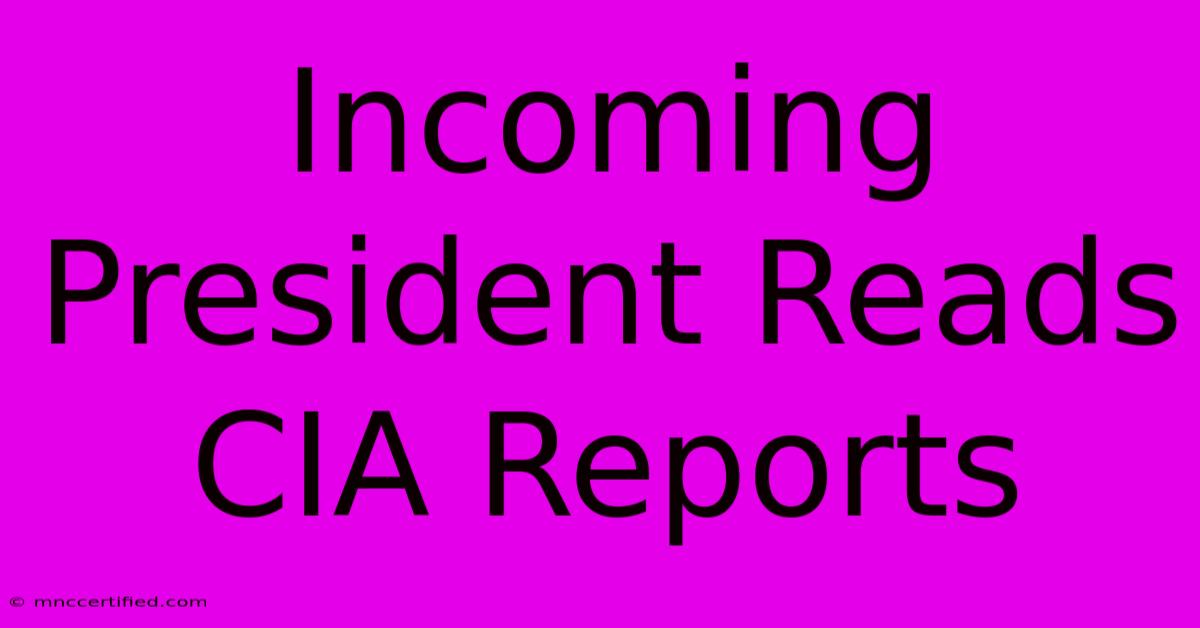Incoming President Reads CIA Reports

Table of Contents
Incoming President Reads CIA Reports: A Critical Transition Ritual
The transition of power in any country is a delicate dance, fraught with complexities and immense responsibility. A crucial aspect often overlooked by the public is the incoming president's review of classified intelligence briefings from the Central Intelligence Agency (CIA). This ritual, far from a mere formality, is a vital component of preparing the new leader for the challenges of the presidency. Understanding its significance is key to comprehending the smooth functioning (or potential disruptions) of a new administration.
The Importance of the CIA Briefings
The CIA provides the incoming president with a comprehensive overview of the nation's most pressing security concerns, both domestic and international. These briefings are not simply summaries of current events; they offer a deep dive into intricate geopolitical situations, potential threats, and ongoing covert operations. The information presented is often highly sensitive, encompassing:
- National Security Threats: This includes terrorism, cyber warfare, nuclear proliferation, and emerging global conflicts. The reports highlight potential risks, vulnerabilities, and the capabilities of adversarial nations.
- Foreign Policy Challenges: Briefings offer assessments of international relations, focusing on key alliances, rivalries, and emerging diplomatic crises.
- Economic Intelligence: The CIA provides insights into global economic trends, potential market disruptions, and the financial strength (or weakness) of other countries.
- Domestic Threats: While less prominent in public discussions, the CIA also assesses domestic security challenges, such as extremism and organized crime.
Beyond the Surface: Analysis and Strategic Implications
The value of these briefings extends beyond simply relaying facts. The CIA analysts provide nuanced interpretations, exploring the potential implications of various scenarios and outlining possible courses of action. This allows the incoming president to develop a well-informed understanding of the complexities they will face. The reports go beyond simply stating "this is happening"; they delve into "why it's happening" and "what might happen next."
The Format and Process: Secrecy and Precision
The precise format and specifics of these briefings are highly classified and remain confidential. However, we know that they are typically delivered in a secure setting, often with a small, hand-picked team of intelligence experts. The briefings are tailored to the incoming president's background and level of familiarity with intelligence matters. This personalized approach ensures that the information is digestible and actionable.
The President-Elect's Role: Active Participation is Crucial
The incoming president is not a passive recipient of information. They are expected to actively engage with the briefers, asking questions, challenging assumptions, and expressing their own perspectives. This interaction is vital because it allows the intelligence community to understand the new leader's priorities and decision-making style.
Potential Challenges and Concerns
Despite its importance, the process is not without its challenges. These include:
- Information Overload: The sheer volume of information can be overwhelming for even the most experienced individuals.
- Conflicting Information: Intelligence assessments often contain conflicting viewpoints and differing levels of certainty, requiring careful consideration and judgment.
- Time Constraints: The transition period is short, placing immense pressure on the incoming president to absorb a vast amount of information in a limited timeframe.
- Political Biases: While striving for objectivity, intelligence reports can sometimes reflect the biases or perspectives of the analysts involved.
Ensuring Objectivity and Transparency
To mitigate these challenges, it is crucial that the CIA maintains the highest standards of objectivity and transparency. The briefings should present a balanced view, acknowledging uncertainties and potential limitations. Independent oversight and rigorous quality control are essential for maintaining public trust in the intelligence community.
Conclusion: A Foundation for Effective Governance
The CIA briefings provided to the incoming president are far more than a routine procedure. They represent a critical transfer of knowledge and power, laying the foundation for effective governance and national security. By understanding the process and its significance, we can better appreciate the vital role intelligence plays in the smooth transition of power and the subsequent success of a new administration. The thoroughness and accuracy of these briefings are paramount to a strong and informed start to any presidency.

Thank you for visiting our website wich cover about Incoming President Reads CIA Reports. We hope the information provided has been useful to you. Feel free to contact us if you have any questions or need further assistance. See you next time and dont miss to bookmark.
Featured Posts
-
Richard Coless Itv Health Check
Nov 22, 2024
-
Lakers Vs Magic 2024 Nba Odds And Prediction
Nov 22, 2024
-
Report Jones On Giants Practice Squad
Nov 22, 2024
-
Maura Higgins And Shane Mc Guigan Dating History
Nov 22, 2024
-
Understanding The Icc Israel Case
Nov 22, 2024